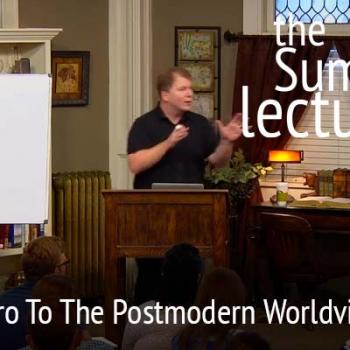
To purchase the entire DVD set of the Summit Lecture Series, visit summit.org.
Abu Bakr was the first successor of Islam after Muhammad and he was the first one who ordered the Qur’an to be collected. After they collected it, they discovered that a verse was missing. In other words, the first written Qur’an was incomplete. And this is just one example of portions missing from even the earliest forms of the Qur’an. But this isn’t my opinion. This comes from the most trusted book in regards to early Muslim tradition, Sahih al-Bukhari.
Most Muslims today are not even aware of this.
After it was discovered that this first collection had faults, another successor to Muhammad ordered a second collection. And after that collection, there were massive disputes amongst the Islamic world.
You see, when they gathered the first collection, the leaders simply tucked it away without spreading it throughout the Islamic world. But, the second collection was spread throughout the Muslim world by Uthman ibn Affan.
One point of contention sprang from the fact that Muhammad had named four teachers of the Qur’an. He basically said, “If you’re going to learn the Qur’an, go to one of these four people.” The “top” two teachers were Abdullah Ibn Masud and Ubai Ibn Ka’b. Yet, here is what Ibn Masub said about today’s version of the Qur’an:
“The people have been guilty of deceit in the reading of the Qur’an. I like it better to read according to the recitation of him whom I love (the Prophet) more than that of Zayd Ibn Thabit.”
How can it be that the top guy who Muhammad chose to teach the Qur’an calls the current version of the Islamic holy book a deception? But, Masud wasn’t alone in his criticism of this version of the Qur’an. Ubai Ibn Ka’b also disagreed with it, but along different lines. Abdullah Ibn Masud said that there should be 111 chapters in the Qur’an. However, Ubai Ibn Ka’b said there is supposed to be 116 chapters. For the record, today’s version has 114 chapters within it.
So the earliest and best teachers of the Qur’an disagree with today’s copy, and they disagreed with one another. The root of this problem is because the Qur’an was initially an oral text, not written. So, when people started to write these words down, there was a great degree of disagreement.
For example, Abdullah Ibn Masud looked at the Qur’an’s first chapter and agreed that it was a prayer that Muhammad taught, and it was taught through Allah, but it was not supposed to be included in the Qur’an. Ubai Ibn Ka’b believed that this first prayer and many others should be included in the Qur’an, which is why he held that there should be more chapters.
All this to say, when you speak with a Muslim, you should understand that the Qur’an was a very different book and went through a very different process before it became the version that Muslims have today. At the very least, it is evident that the earliest teachers disagreed with today’s copy and amongst themselves.
And here’s the kicker: After Uthman ibn Affan spread the Qur’an across the Islamic world and these disputes began to arise, he ordered the leading teachers to come together and bring all of their respective texts of the Qur’an with them. Then, in order to have uniformity of the Qur’an, they burned all the teacher’s manuscripts so that there was only the one official version left. This is why what we have today can only be traced back to Uthman, since everything before that time was destroyed.

Now, keep in mind that – like me when I was a Muslim – most Muslims believe that the Bible is invalid because it has been corrupted. However, I could not come up with a model of how the Bible could have been uniformly corrupted. I tried and tried to find a way that the Bible could have been collected and someone sat down, changed the texts and then dispersed them throughout the known world. But, this event never happened.
However, this event did happen with the Qur’an.
This is why Ibn Umar was quoted by his son, Abu Ubaid:
“Let none of you say, ‘I have learned the whole of the Qur’an,’ for how does he know what the hole of it is, when much of it has disappeared? Let him rather say, ‘I have learned what is extant thereof.’”
The idea that today’s Muslims hold saying that the Qur’an is perfectly preserved is merely a modern idea. The earliest Muslims did not believe this.
Today’s Qur’an was printed in 1924.
Despite this, you’ll hear many Muslims today claim that the Qur’an is uniform and no matter where you go in the world, the Qur’an you’ll find is exactly the same. Yet, with the Bible, there are a multitude of different translations and versions. This, they claim, makes the Qur’an superior.
Yet, as I said, this version of the Qur’an wasn’t even around before it was printed in 1924 in Cairo. The perfect preservation of the Qur’an is historically untenable. It’s asking the wrong kind of question. From a logical standpoint, the idea that the Qur’an’s text is perfectly preserved since the time of Muhammad is a category fallacy. The truth is that the original Qur’an wasn’t written as we see it today… it wasn’t written at all, as it was only an oral text.












